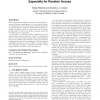Free Online Productivity Tools
i2Speak
i2Symbol
i2OCR
iTex2Img
iWeb2Print
iWeb2Shot
i2Type
iPdf2Split
iPdf2Merge
i2Bopomofo
i2Arabic
i2Style
i2Image
i2PDF
iLatex2Rtf
Sci2ools
86
Voted
CIKM
2007
Springer
2007
Springer
Index compression is good, especially for random access
Index compression techniques are known to substantially decrease the storage requirements of a text retrieval system. As a side-effect, they may increase its retrieval performance by reducing disk I/O overhead. Despite this advantage, developers sometimes choose to store index data in uncompressed form, in order to not obstruct random access into each index term’s postings list. In this paper, we show that index compression does not harm random access performance. In fact, we demonstrate that, in some cases, random access into a term’s postings list may be realized more efficiently if the list is stored in compressed form instead of uncompressed. This is regardless of whether the index is stored on disk or in main memory, since both types of storage – hard drives and RAM – do not support efficient random access in the first place. Categories and Subject Descriptors H.3.4 [Systems and Software]: Performance evaluation (efficiency and effectiveness) General Terms Experimentat...
Related Content
| Added | 07 Jun 2010 |
| Updated | 07 Jun 2010 |
| Type | Conference |
| Year | 2007 |
| Where | CIKM |
| Authors | Stefan Büttcher, Charles L. A. Clarke |
Comments (0)

